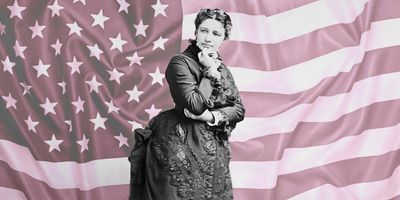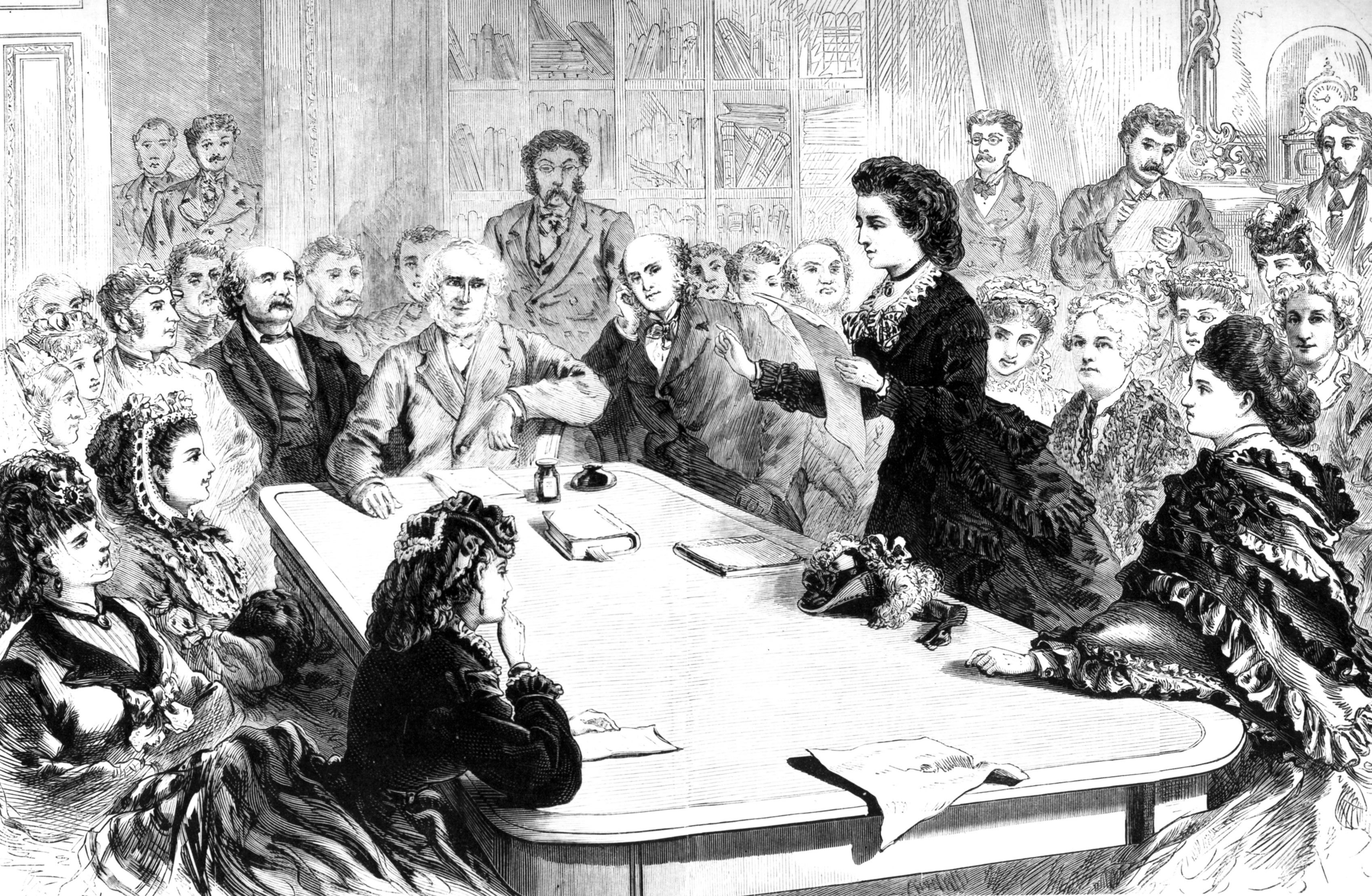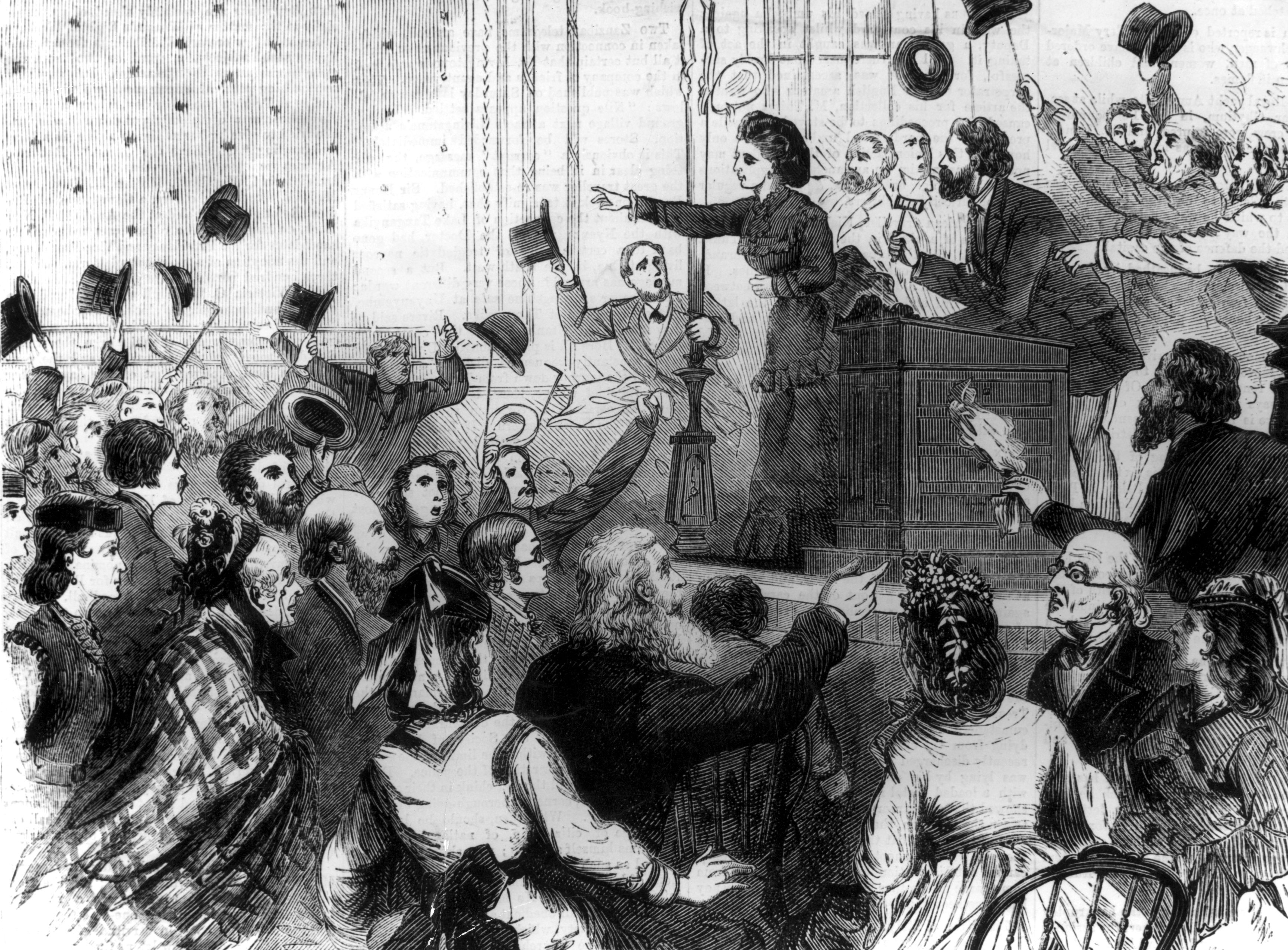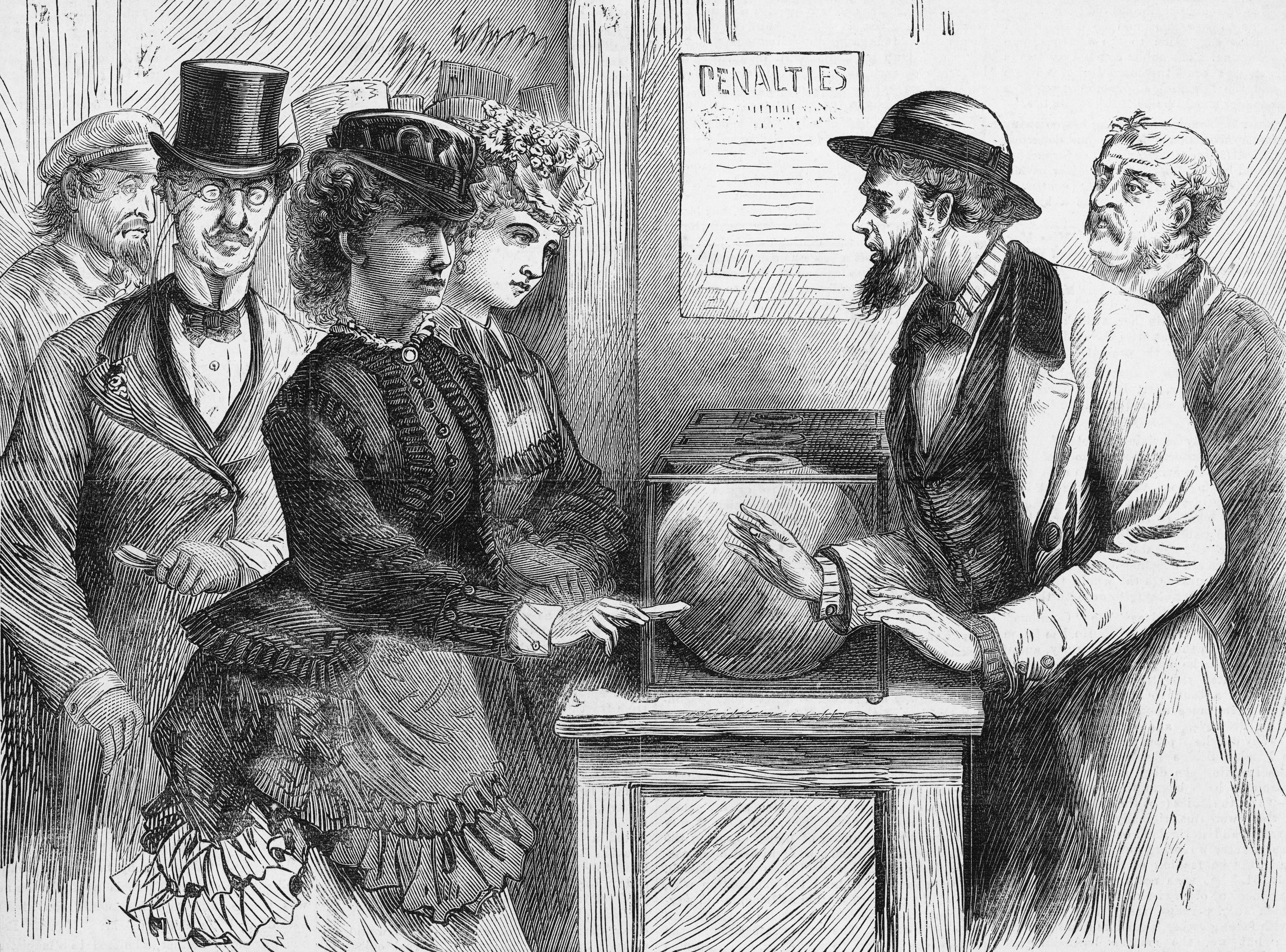Meet "Mrs. Satan," AKA America's First Female Presidential Candidate
Before Hillary Clinton, there was Victoria Woodhull.


From now on, when people indignantly claim that the animosity Hillary Clinton met when running for president was specific to her, tell them the story of Victoria Woodhull. She was the first woman to run for President in 1872, and spoiler alert: It didn't turn out great. (To be fair, while Woodhull didn't have a private email server, she did believe that she could cure cancer with her mind.)
Woodhull was born in 1838, the child of an alcoholic father who likely set her family's home ablaze for insurance money. By the 1850s, he had Woodhull and her sister working as "medical clairvoyants" in a fervent attempt to set their finances aright. Woodhull made elixirs to cure people's ills, and even claimed she could heal sick people with her very presence. Her life became stranger still when she turned 15 and married Canning Woodhull, an older man who professed to be a doctor and turned out to be a broke alcoholic with no medical credentials.
Being a complete fraud isn't a promising beginning for any presidential candidate, but whether or not her elixirs were a sham (they were), Woodhull was extremely skilled at selling them. By 1866, she was a somewhat famous and extremely wealthy woman who had divorced Woodhull and instead married Colonel James Harvey Blood, a Civil War hero from the Union Army. Blood was a "champion of freedom in all domains," which might explain why he and Woodhull chose to practice Free Love in the form of an open relationship. Woodhull would later state that she had "an inalienable constitutional and natural right to love," and that she could "love as long or as short a period" as she liked and "change that love every day" if she pleased.

Victoria Woodhull reads her argument in favor of women's voting to the House of Representatives' Judiciary Committee in 1871.
This sense of freedom was revolutionary—especially considering that Woodhull was living in an era when men controlled women to such an extent that they were entitled to their work profits. To cap it off, Woodhull even kept her own name.
On the flip side of the sexual-freedom coin (and as further reminder of the inescapability of male control at the time), Woodhull discovered that her pyromaniac father was pimping her sister, Tennessee. So she invited Tennessee to live with her in New York City.
Women are the equals of men before the law, and are equal in all their rights.
As its current inhabitants are well aware, New York is always a good idea if you're a forward-thinking, absurdly ambitious human, and in 1868, Woodhull and her sister opened the first female-owned brokerage house on Wall Street with help from Cornelius Vanderbilt (he was a fan). They never hid anything about their past; in fact, they did the opposite, and left a scrapbook filled with articles about themselves in the front office so investors could see exactly who they were dealing with. Victoria and Tennessee's firm was—perhaps unexpectedly—hugely successful, with a large clientele of women who wanted to work with other women: widowed wives, high-class prostitutes, actresses, and anyone else who was lucky enough to have their own money. Eventually, they started a weekly newspaper dedicated to promoting political reform and exposing frauds on Wall Street. Oh, and they were also the first American publication to reprint the The Communist Manifesto.
At this point, Woodhull's probably sounding more and more like a viable presidential candidate, right? (Minus the curing cancer with her brain thing. We can all agree that was iffy at best.) The problem is, when she ran for president in 1872, the very culture that encouraged her to be an interesting local anomaly wasn't enthusiastic about her having any real power. But that doesn't mean Woodhull didn't advocate for herself. In 1871, she spoke before Congress and declared the following:
Get exclusive access to fashion and beauty trends, hot-off-the-press celebrity news, and more.
"Women are the equals of men before the law, and are equal in all their rights. If Congress refuse to listen and to grant what women ask, there is but one course left to pursue. What is there left for women to do but to become the mothers of the future government?"
Congress didn't agree.

Victoria Woodhull campaigning for president in1872
A year later, Woodhull followed through on her promise to become "the mother of a future government" and began her presidential campaign as a member of the newly formed Equal Rights Party. She stood before 668 delegates in New York and vowed to fight "despotism, inequality, and injustice." She called for women to have the right to vote, for financial regulations, and for an end to industrial exploitation. She wanted Frederick Douglass to run alongside her as Vice President. Her audience cheered and cheered, and a judge nominated her for President of the United States.
And it all went downhill from there.
Everything Woodhull stood for was publicly mocked: her ties to spiritualism, her belief in free love. And while those beliefs are still controversial today, she was also shamed for her former marriage to an alcoholic and her love for wearing "short skirts" (note: said skirts came up to her ankle). The bullying continued so relentlessly that before long, popular caricaturist Thomas Nast began describing her as "Mrs. Satan." In one drawing, Woodhull's depicted with bat wings as a mother carries her child up a hill. The mother exclaims, "I'd rather travel the hardest path of matrimony than follow in your footsteps." (Never mind that Woodhull was married with two children herself.)

Victoria Woodhull and Tennessee Claflin are denied the right to vote in New York, 1875
Fellow suffragists spurned Woodhull, and her business began to fail. Meanwhile, Frederick Douglass never even acknowledged her request that he run alongside her. The final blow came when Woodhull was thrown in jail just before the election because her weekly publication ran an article about—among other controversial subjects—a stockbroker who was known for getting underage girls drunk and then having sex with them. She and her sister were arrested for publishing "obscene materials," and, as far as research can determine, nothing happened to the rapist stockbroker.
From the ashes of my body a thousand Victorias will spring to avenge my death.
Victoria and Tennessee were released from prison after paying $16,000 in bail, and it will surprise no one that Woodhull did not, in fact, become president. Instead, seemingly saying "to hell with this garbage country that hates women so much," she moved to England and worked to support their suffragette cause. She died in 1927, a year before Englishwomen won the right to vote.
It is now almost 150 years since Woodhull's run for president, and this country has still never seen a female take up the role. It's not the most uplifting ending to this story—or to our recent near miss—but you might take comfort in Woodhull's words:
"They may succeed in crushing me out, even to the loss of my life; but let me warn them and you that from the ashes of my body a thousand Woodhulls will spring to avenge my death by seizing the work laid down by me and carrying it forward to victory."
From the ashes we rise. The story isn't over.

Jennifer Wright is the author of It Ended Badly: 13 of the Worst Break-Ups In History and the upcoming Get Well Soon: History's Worst Plagues.
Jennifer Wright is BAZAAR.com's Political Editor at Large. She is also the author of 'Get Well Soon: History's Worst Plagues and the Heroes That Fought Them' and 'It Ended Badly: 13 of the Worst Break-Ups In History.'
